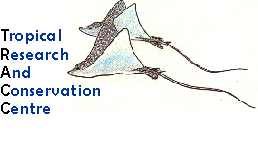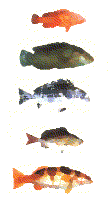|
|
|
|
The effects of cyanide fishing
|
 |
|
|
|
SOCIAL AND ENVIRONMENTAL COSTS
|
Social costs
The fact that cyanide is lethal in small doses to a wide range of marine organisms is well known. The social cost of the trade is also of concern. The divers, are subject to diving practices that regularly cause crippling injuries or even deaths. Frequent repeat dives are made to 50 plus metres, without regulators, and breathing oil contaminated air. Dive watches or depth gauges are not used and decompression stops unheard of. Divers regularly get skin bends and severe bends or embolisms are common; participants apparently accept the risks because of the high economic returns.
|
|
One other social cost of this fishing practice was observed. The eldest child (less than 5 years old), in a small fishing boat mixed the cyanide with water in an open container using his hand to stir it and then as a cover to stop the mixture splashing out. We cannot help but wonder "How long it will be before the cyanide on the hand is transferred to the child's mouth?" |
|
Environmental costs
Reef corals are 99% skeleton, covered by a very thin layer of animal tissue, containing millions of single-celled algae. Cyanide causes the corals to release these algae into the water. This stress reaction causes the coral to turn white, or "bleach", because it is the algae that give most corals their color. The coral tissue often dies within a few days or weeks quickly rotting away and exposing the coral skeleton. Boring organisms gradually attack the skeleton, and it slowly disintegrates.
Other environmental costs are less understood but it is clear that small fish, corals and other organisms are killed in unknown numbers and with unknown ecological effects.
|
Photo: J. M. Cervino
A DIVER SQUIRTING CYANIDE IN AN ATTEMPT TO CATCH A FISH. NOTE THE BLEACHED CORAL. |
||
|
Reefs may take decades to recover from the impact of cyanide fishing. Researchers have found that in laboratory conditions, corals exposed to small dosages of cyanide die within a short time.
|
|||
|CYANIDE FISHING| |REGIONAL THREAT| |THREATENED SPECIES| |MARKET FORCES| |SOCIAL AND ENVIRONMENTAL COSTS|

![]()
SEE ALSO:
|POPULATION DECLINES IN LARGE FISH STOCKS| |GROUPER SIZES IN AREAS WITH AND WITHOUT FISHING| |BLAST FISHING|
FISH POPULATIONS AROUND SABAH
 |
SMALL GROUPERS |
| HUMPHEAD WRASSE | |
| SWEETLIPS | |
| RED + BLACK SNAPPERS | |
| CORAL TROUT |